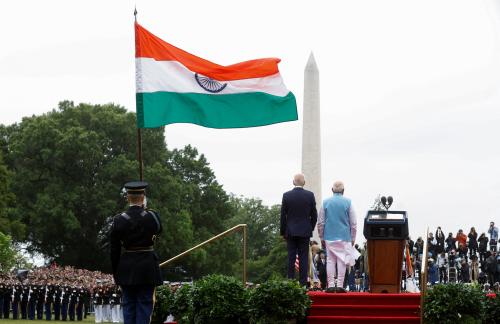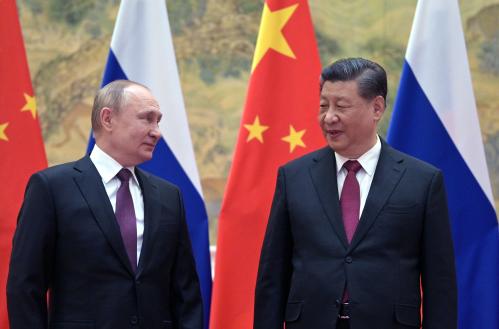On April 4, Foreign Policy at Brookings hosted an event on Still Ours To Lead: America, Rising Powers, and the Tension between Rivalry and Restraint, a new book by Bruce Jones, director of the Project on International Order and Strategy (IOS) and senior fellow in Foreign Policy. During the discussion, moderated by CBS News’ Margaret Brennan, Jones outlined his book’s premises and conclusions. He said that while there is a “kernel of truth” to the “dominant narratives”—America is in decline; a rising bloc of nations, e.g., the BRICS*, is challenging the international order; chaos is coming—these are “badly exaggerated.”
“If you look at the dynamics of rivalry, only American military power can constrain and limit those dynamics. And only American diplomatic, and economic and coalitional power can animate the incentives for restraint and the prospects for cooperation. And in both senses … it’s still ours to lead.” – Bruce Jones
Having studied the fundamentals of American power, Jones stated, he reached these conclusions:
That the United States is an enduring, not a declining power.
That there are important points of unity and important points of overlap of interest within the BRICS, it’s true, but profound strategic divides. And the phrase I use in the book is, “There is no mortar in the BRICS.” They are divided, not unified actors.
Moreover, they are not the only actors on the international stage. The United States still has an enormous number of allies. … We have never in modern history seen the phenomenon of the top power being heavily endowed with allies. And our allies are not small, minor states in the international system. 15 of the top 20 economies in the world are American allies and it’s easy to neglect what that means in terms of amplifying American power.
Jones sees “powerful and important drivers of rivalry and security competition” but also “powerful interests driving restraint and scope for cooperation.” He explains that the emerging powers are caught “on the horns of a dilemma”:
we see the emerging powers again and again behaving in ways that show they are caught essentially on the horns of a dilemma. On the one hand they would like to occupy more space on the international stage, exert more influence, play a greater role. But at the same time their ability to do so depends profoundly on a stable global economy and a stable international system that they cannot produce by themselves. And in the critically important domain they can only achieve that stability through some form of tense cooperation with the United States.
We are going to be, he says, in both a cooperative world and one of geopolitical competition and rivalry for “a considerable period of time,” which has important implications for U.S. power—military and non-military:
I think it’s very clear … that in Asia, in Europe in the Middle East, it remains the case that the only serious force deterring the kinds of rivalry and security competition that we’ve seen is American military power and the willingness to use force, or hard power if you like that phrase. …
The only military power, only American military power, and the willingness to use force if necessary can deter the kinds of rivalries and deter the kind of competition and aggression that are serious threats in all of those theaters.
I think it is also true that it is only American economic, diplomatic and coalitional power that can animate and materialize the incentives for restraint and the opportunities for cooperation.
And we have to put equal emphasis on those two things.
Robert Kagan, a Brookings senior fellow and author of The World America Made, commented on the America’s willingness to use its power. He said he sees “a lack of willingness to use it” and that that “a very large number of Americans [don’t] understand why it has to be used at all.” Americans, Kagan said, have been persuaded by some that “we’re in decline” and, as he put it:
I’m not sure they have yet been persuaded why anything that happens out there matters. So I think the real challenge that we face right now, those of us who think that things do matter, is explaining why. And it’s not simple because it’s not a simple national interest: if we don’t do something in Syria we’ll get attacked. That may or may not be true. If Russia takes Ukraine, so what? And I think that is the real challenge. And It’s hard because you can’t say, well if that happens then this happens and eventually it will hit us. It’s a little bit more complicated than that.
Brookings President
Strobe Talbott
, when asked where does the responsibility fall for persuading Americans that their country playing a role in the world matters, answered simply: “I’d start with the president.”
There’s been a lot of commentary to the effect that for all of President Obama’s analytical skills, his good instincts, his vision, that he has way underused the bully pulpit. And, better late than never. I think this a situation [Russia and Ukraine] we have now that just cries out for that. Not that he hasn’t made a number of reasonably strong public statements, including in Europe, but he hasn’t really gone to the American people and said, this is why it matters and put it in the historical context that Bob was referring to and also to the contemporary context of what the threat is … The fact that the territorially largest country on the planet … is now engaging in territorial expansion and … aggressive nationalism, aka irredentism, and also happens to be one of the two major nuclear powers, is going back to the geopolitics that … got us into two world wars in the twentieth century and made quite a hash out of the late nineteenth century. That needs to be put forward by him. … Let’s hear something from the Oval office on this, big time and soon.
Kathleen Hicks, the Henry A. Kissinger Chair and senior vice president at the Center for Strategic and International Studies, said that “the U.S. is not expending its power as well as it could be in various crises and I think that that is having a spillover effect into the view that is held by the U.S. by those who might try to take advantage of that.”
“What concerns me in the world today,” Hicks added later:
is that we don’t use our power effectively in a way that demonstrates that it has relevance. And I worry most about East Asia, I worry about a lot of things … there are lots of threats, climate is a threat, there are a lot of different things to worry about. The nationalism that we see stirring in East Asia and the chances for miscalculation because of the way the relationships are built there worry me. And I think what happens in Ukraine, what happens in Syria, one by one back to my point earlier about selective engagement: you can make rational cases for US policy in almost any particular case but when you build a pattern of response, willingness or capability that looks like it allows for aggression, I think that it is a problem … And hard power is an important part of that solution.
Listen to a full audio recording below or get more information
from the event’s page
.
* Brazil, Russia, India, China, South Africa



Commentary
America Remains an Enduring, not a Declining, Power
April 4, 2014